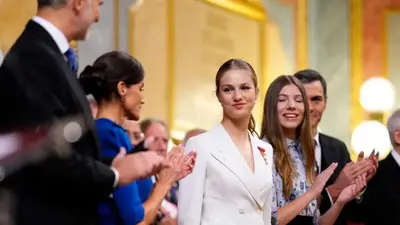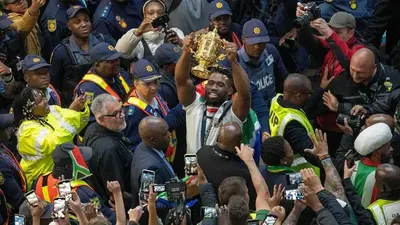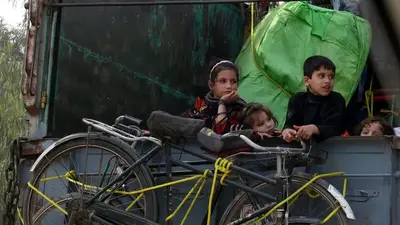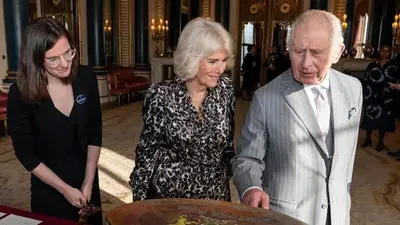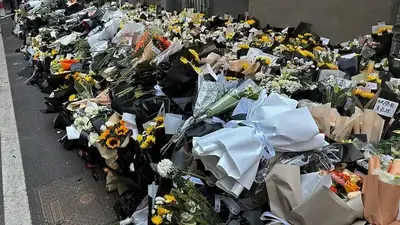World News
UK’s governing Conservatives face a reckoning with voters in 3 special elections
LONDON -- Bad things may come in threes for British Prime Minister Rishi Sunak, whose Conservative Party faces a trio of unwanted verdicts from voters this week.
The U.K. is holding three special elections for House of Commons seats on Thursday that will let a broad cross-section of voters — in northern England, southwest England and on London’s suburban fringe — deliver a verdict on the party that has governed Britain since 2010.
The Tories are bracing for the worst.
“Midterm by-elections for incumbent governments are always difficult,” Sunak said Monday. “I don’t expect these to be any different from that.”
It could be different, or at least rare, if the Conservatives lose all three seats. The last time a governing party lost three by-elections in one day was in 1968 under Labour Prime Minister Harold Wilson.
The three elections are part of the still-rippling shockwaves from the turbulent term of ex-leader Boris Johnson. He quit as a lawmaker last month, almost a year after resigning as prime minister, when a standards watchdog concluded he’d lied to Parliament about lawbreaking parties in his office during the coronavirus pandemic.
An ally followed Johnson out the door, and another lawmaker has resigned amid sex and drugs allegations, triggering the three by-elections.
Labour hopes to win Johnson’s old seat of Uxbridge and South Ruislip in suburban London, as well as the mixed urban-rural Selby and Ainsty constituency vacated by Johnson ally Nigel Adams in northern England. The centrist Liberal Democrats are favored to win in southwest England's Somerton and Frome, whose Conservative legislator, David Warburton, quit over allegations of cocaine use and sexual misconduct.
A trio of Conservative defeats would increase grumbles that Sunak is failing to turn the party’s fortunes around after the mayhem caused by the scandal-plagued Johnson.
Conservative lawmaker Steve Brine – one of almost 50 Tory parliamentarians who say they'll step down before the next national election, due by the end of 2024 – quipped this week that the party’s doldrums were the result of “Long Boris,” the political equivalent of Long COVID.
Sunak also took over an economy reeling from the brief term of ex-Prime Minister Liz Truss, who quit in October after six weeks in office when her tax-cutting economic plans drove up the cost of government borrowing and hammered the pound. That worsened a cost-of-living crisis that has left 1 in 20 people running short of food each month, according to the Office for National Statistics.
Three opinion polls this week gave Labour a lead of at least 15 points over the Conservatives nationwide.
Hannah Bunting, a University of Exeter politics lecturer and Sky News election analyst, said the Conservatives are facing electoral challenges in “three different types of battlegrounds” on Thursday – and to lose all of them would be ominous.
“If you are losing where (the number of people with) mortgages is high like in Selby and Ainsty, and you’re losing in the outer belt of London … and you’re losing in the southwest, which is usually a Conservative heartland, then there’s not going to be too many seats where you can guarantee a Conservative (lawmaker) returned at the next general election,” she said.
The Bank of England has hiked its central interest rate at 13 consecutive meetings, to 5%, in a bid to tame inflation that is falling but remained at a still-high 7.9% in the year to June. Four in 10 renters say they are struggling to pay the rent and millions of homeowners face steep increases in their mortgage payments as a result of persistently high inflation.
The soaring cost of living has driven hundreds of thousands of public sector workers, including doctors and nurses, out on strike, worsening pressure on the overstretched public Health care system.
In Selby, 24-year-old voter Lewis Foley said he was undecided but “leaning more towards Labour.”
“My family are all Conservatives, but I think they are leaning the same way as me,” he said. “Some of them have been impacted really badly by the cost-of-living crisis. Everything’s expensive, and most people are in the same boat.”
Sunak has vowed to halve iNFLation by the end of the year. He acknowledged that high rates were “proving more persistent” than he wanted, but insisted he was “the right person to tackle it.”
“I think people trust me when it comes to managing the economy, and they trust me to be honest with them because, you know what, bringing inflation down does mean you have got to make some difficult decisions sometimes because they are the right long-term ones for the country,” he told radio station LBC on Monday. “That’s what I’m about.”
Labour leader Keir Starmer will face pressure of his own if the party doesn’t win Johnson’s old seat, where the Conservatives are focusing on a divisive local issue – a pollution-cutting levy on older gas-powered and diesel vehicles introduced by London’s Labour Mayor Sadiq Khan.
Bunting said Labour would have some “soul-searching” to do if it failed to capture at least one of the three seats from the Conservatives on Thursday.
The governing party will depict even one victory out of three as a success. Three defeats will pile pressure on Sunak, to make major changes to his government, just as disaffected Conservative lawmakers head home from Parliament a summer break spent musing on their dimming electoral fortunes.
“That’s not the way you want to be heading into the summer recess, with all that pressure on you,” Bunting said.
She said Sunak “doesn’t really have that many options left.”
-

 World News6h ago
World News6h agoA Week After Spain’s Catastrophic Floods, Families Hold Out Hope That Loved Ones Are Not Among the Dead
-

 World News11h ago
World News11h agoNorth Korean Troops in Russia Are Shelled by Ukrainian Forces, an Official Says
-

 World News1d ago
World News1d agoNorth Korea Fires Multiple Missile Tests in Show of Force on U.S. Election Day
-

 World News2d ago
World News2d agoIsrael-Hezbollah Conflict Death Toll in Lebanon Surpasses 3,000 in 13 Months
-

 World News2d ago
World News2d agoHow AI Is Being Used to Respond to Natural Disasters in Cities
-

 World News2d ago
World News2d agoGermany’s Top Diplomat Is in Kyiv as Ukraine Braces for Impact of U.S. Election on the War
-

 World News2d ago
World News2d agoWhat to Know About the Unprecedented Floods That Killed More Than 200 in Spain
-

 World News2d ago
World News2d agoVolcanic Eruptions in Indonesia Kill at Least 10
